Alan Baxter's Blog, page 93
January 16, 2011
After The Rain ebook appeal for Queensland flood relief
I think pretty much everyone has heard about the shocking floods up in Queensland, even if you're not an Australian. It really has been terrible and the people up there need our help. FableCroft Publishing has come up with a great idea. They've been putting together an anthology of short stories called After The Rain, which is due for release soon. Given the rather portentous title of the book, editor Tehani Wessely has made an advance ebook copy of the book available for anyone that donates to the flood relief appeal. It's a brilliant idea and a brilliant cause. It's also bound to be a brilliant book, given the sterling list of contributing authors.
All the details are here. Go and get yourself an ebook and do your bit to help those people struggling up north.
.
January 8, 2011
FWOR – Fantasy Writers On Retreat
I've just got back from a very productive few days at a writers retreat. It's the first time I've done such a thing, and I like it. I was kindly invited by the existing FWOR (pronounced fwooooaaaarrrr!) group of Cat Sparks, Donna Hanson, Nicole Murphy, Russell Kirkpatrick, Matthew Farrer and Kylie Seluka. Other FWOR writers include Joanne Anderton, Ian McHugh and Trudi Canavan. Joanne will be joining the this retreat next week and Ian and Trudi can't make it this time, but you can see the awesome company and imagine why I was so honoured to have been invited along. Sadly I could only manage a few days of the two weeks, given other commitments (damn you, real life!), but I made good use of the time I did have.
The retreat basically consists of hiring a big house in the middle of nowhere and sitting around writing all day, then playing games, watching movies and drinking all evening. Yes, it's a kind of heaven.
I needed to drastically rewrite the first three chapters of the novel I'm working on and then run a solid edit over the whole thing. I got the rewrite done and half the book edited in the time I was there. Others did great work while I was there too, especially Russell, who spent two days working diligently on a map that turned out to be a vagina. Outstanding effort.
In the evenings we drank, gamed and watched some sterling films, including Hot Fuzz and a BBC production called Cruise Of The Gods. If you've ever been to a con, you HAVE to see Cruise Of The Gods. It's brilliant. Cat and Russell also had several more rounds in their ongoing Ping Pong War. Cat spent a lot of time before the retreat telling Russell that his arse was toast this time around. When I left, the score was 5-3 to Russell, so Cat's got some work to do. Matthew introduced me to a game called Dominion, which I enjoyed immensely and will now have to buy.
The place we stayed was called Stone Hedge, about 10km outside Oberon and it's a pretty cool house. It has a pool table, ping pong table, air hockey table and many deer. I'm disappointed that I couldn't stay longer as I was getting such a lot of work done and having a top time. Maybe next time I'll get to stay longer. If I get invited back, that is. Hopefully the massive chili con carne I cooked up the other night has bribed them all into letting me come again.
There's an official FWOR blog here – http://fantasywritersonretreat.wordpress.com/, which I'm supposed to be posting on. However, I've had a bit of trouble accessing that. I'll cross post this entry when that gets sorted out. In the meantime, here are a few pics from my time there:
The FWOR: (l to r) Russell, Kylie, Alan, Donna, Matthew, Nicole, Cat (and the raven)
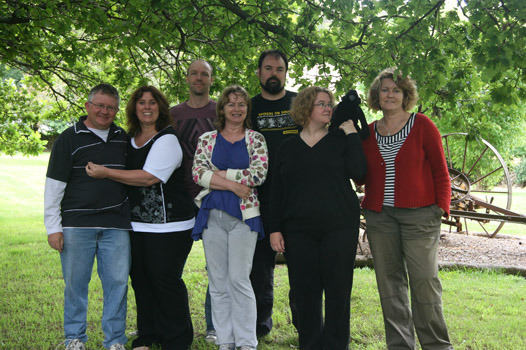
Stone Hedge
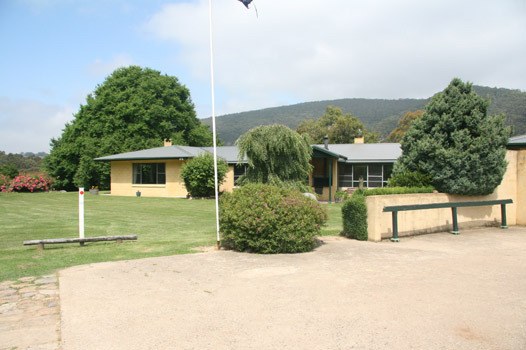
The Workspace
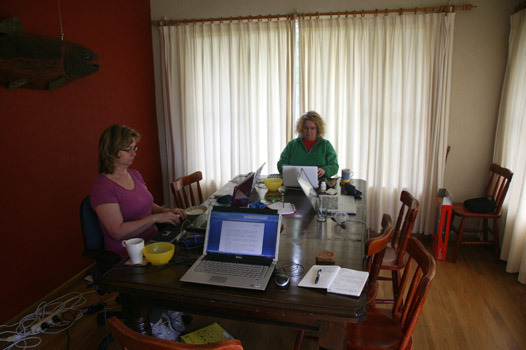
Matthew's space
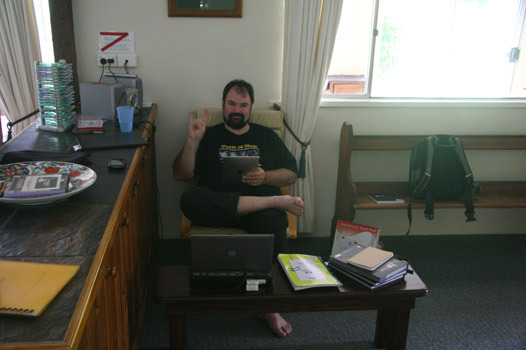
Cat feeding the local deer

Russell murdering a roast lamb dinner
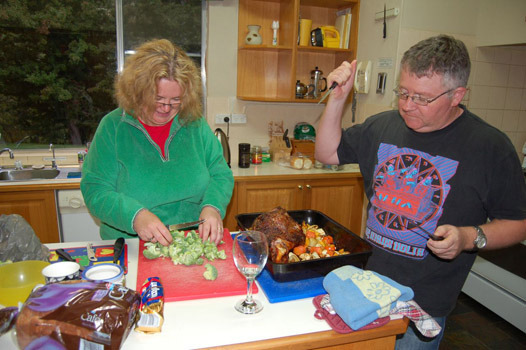
Me murdering Russell at pool (I got lucky)
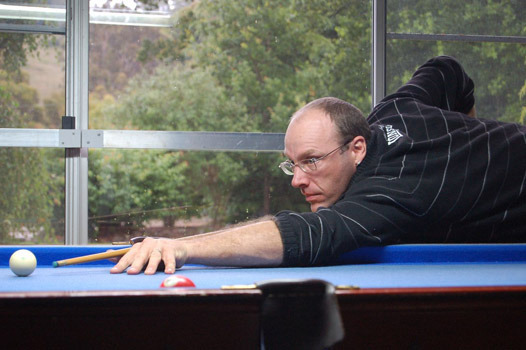
Russell giving Cat the only arsetoast she's going to get (according to him)

(The photos above were taken by myself and Cat Sparks)
.
Real life superheroes, the saga continues
Most of you that have been reading here for a while will remember the madness that ensued when I posted about the RLSH, or Real Life Super Hero, movement back in December 2008. That post went nuts and I closed the comments after 156 responses and much chest beating and mockery. It was actually a really interesting discussion for a while and I learned a lot from it. You can read it all here if you're so inclined. It'll take you a while.
Anyway, one of the people that got involved in that discussion, Damien Smith, recently sent me this. I felt the need to share. Enjoy.
VIDEO: Real-life superhero fights crime in US
.
January 3, 2011
Write what you want to read
You may remember that Book Lover's Club on Facebook published a really great review of RealmShift recently and, as part of the subsequent promotion, ran a contest to win a signed copy of the book. They asked people to suggest topics for me to blog about and the one I liked best would win the signed copy, and I'd write the suggested blog. I ended up choosing Alex Stoiche's suggestion:
Id love to see his thoughts on writing for art or self satisfaction versus writing for a market. Obviously its a fine line and its crucial to please the audience to some extent, but Id like to hear an opinion on where it may go too far or about writers that have such conviction they won't compromise.
I chose this suggestion because it's something I've been thinking about a lot lately.
There are innumerable markets out there, with more cropping up all the time while others whither and die. The publishing industry is in a state of constant flux and part of the job of being a writer is staying aware of who's doing what. There are the "big 6″ publishers and all their subsidiary imprints that are fairly solid and not going anywhere fast. They certainly follow trends but, contrary to the views of some disenfranchised newbie writers, they're not averse to new voices and styles. Orbiting those big names are millions of smaller publishers, for novel length and short story work, all trying to carve out their niche in a bloated industry.
With that in mind, it's tempting to try to follow or predict trends. Marketers and editors are doing that all the time, but they're also doing their best to ignore that and create new trends. You can imagine, for example, the inundation of wizard school books on publishers desks after the success of Harry Potter. I'm sure editors are still drowning in a papery sea of awful vampire romance after the inexplicable success of the Twilight series. People will always leap onto a bandwagon and try to whip some more mileage out of it. I think this is a fool's path.
The same goes for short fiction. I love short stories – I love reading them and writing them. It's tempting, with the plethora of short story markets out there, to try to emulate the style or subject of the more popular ones. You can look at Clarkesworld, for example, and see that there's a distinctly literary bent to the spec fic they publish. Or you study any market you'd like to be published in and try to see the pattern, figure out what it is those particular editors are moved by. Indeed, most submission guidelines for these places will say something along the lines of: "If you really want to know what sort of thing we publish, it's best that you buy and read a few issues of our magazine." This is quite reasonable. It's also a great way to generate some extra sales, because the magazine is suggesting that by reading lots of issues you'll deduce some magic formula that'll get you published there. It's not really true. Sure, you should never send a vampire romance story to a science fiction magazine, but that's just common sense. Then again, if your vampire romance takes place on a colony ship heading to Alpha Centauri, you might be in with a chance. I really doubt it, but you know what I mean.
The truth is, if you know a market buys a certain style and genre of story, that's enough. Apex buys dark science fiction, Beneath Ceaseless Skies buys otherworld fantasy, Black Static buys horror and so on. A good solid read of these things will certainly give you a bit of a clue towards the tastes of the editors, but that probably won't help you.
You see, the thing is that you can't necessarily write like someone else. If you try to emulate a style, it comes across as amateur. The reason for that is simple – your heart and soul aren't in it. You're trying to co-opt someone else's heart and soul. Personally, I want to write excellent Alan Baxter stories, not stories like those of [insert author here] written by Alan Baxter. The difference, to me, is enormous.
As a writer I'm constantly trying to improve my craft and refine my voice. The more I write, the more that happens. The more that happens, the more publishing success I get. There's no secret formula to getting published. It's all about getting good. Sure, there are those people out there that are really good craftsmen/women and can write to a style or requirement, but they took a long time getting good enough to do that. And they did that by writing their own stuff first.
I want to be recognised for my writing, my ideas, my style. When that stuff gets good enough, I'll sell stories to the places that pay pro rates and have the big kudos attached. Hopefully I'm getting nearer to that all the time. If you constantly put aside what you want to write and try to churn out stuff that you think people want to read, it's likely to be soulless and rather dull. And it probably won't sell. If you do turn out to be good at it and it does sell, I'd wager that the sense of achievement will be rather tempered by the knowledge that it's not really your thing. If that works for you, great. It doesn't appeal to me.
For me, the best thing to keep in mind is that I should be writing the kind of stuff I want to read. If I look at a story of mine and, after reading it, think to myself, "That was a great story, I'm glad I read it" then I can certainly be pleased that I wrote it! I'm a voracious reader and I'd like to think that other people out there also want to read the kind of stuff that I do. Therefore, it makes sense for me to write the kind of stuff that I want to read.
I'm happy to take editorial advice. Whenever I've had an editor give me suggestions about a piece of work it's invariably ended up a better story. I always try to run my stuff through crit groups or at least have a couple of trusted friends read over it and I pay close attention to their criticisms. This is how we avoid being precious about our stuff. If something I've written strikes me as being the dog's bollocks and then a few people read it and say, "Nah, this isn't working for me" then I'll listen to them. But I'll still try to apply my voice and style to any rewrites or edits. I want people to tell me what they like and don't like, and why, but not tell me what I should write. There's a big difference.
Compromise is always on the cards. If I have an editor say to me, "I'd like to buy this story, but I don't like this aspect, can you change it?" then I'll change that aspect in a flash. Even more so this becomes an important factor in novels. Selling a novel is bloody hard, so if I have to make some editorial changes to get one sold, I'll do it. It would have to really affect my sense of my own art for me to refuse. There would certainly be some things that I'd be disinclined to do just to sell a story or novel, but not many. I can usually see the merit in editorial suggestions like these and it's important to develop that ability to kill your darlings. As writers, we're the worst critics of our own work. Of course we think it's good – we wrote it and are trying to sell it, so we must think it has credit. Of course, if we really baulk against the advice then we have to ask ourselves this: Am I being really precious here, or is this publisher just not right for me? It's most likely to be the first one, but you need to stay aware of what you're trying to do with your art and only compromise within boundaries that you're comfortable with.
I want to sell stories, get published and, in the process, get better as a writer. Usually, as I mentioned above, editorial advice always makes the story better. But I still want it to be an Alan Baxter story. I want it to be my art that's got good enough for someone to step up and buy it and for other people to take the time to read it. And hopefully enjoy it. That's always going to be my aim.
.
January 2, 2011
New Age of Publishing – Guest Post 5 – April Hamilton
My new publishing series continues today with a post from April Hamilton called "How Meaningful A Metric Is Your Book's Amazon Sales Rank?", which is, obviously, all about the sales rank on Amazon. It makes for some pretty interesting reading. Check the links is April's bio at the end, as there's some good stuff in there. All yours, April:
How Meaningful A Metric Is Your Book's Amazon Sales Rank?
Ah yes, the Amazon Sales Rank: that addictive bit of eye candy that can lift an author's spirits into the stratosphere one day and hurl him down onto the rocks the next. In all likelihood neither reaction is truly justified, because a book's Amazon Sales Rank is a temporary, relative thing, and does not mean what many authors think it does. If you want to get to the bottom of what your book's ASR means, you might start by thinking about what the ASR does not mean.
First, it does not reflect a cumulative sales count. Let's say Amazon has 1 million titles listed for sale on its site—it actually lists many more than that, but let's keep the math simple. Let's further say that Amazon opened its virtual doors exactly one year ago today, and your book is currently ranked #500,000. It would seem logical to assume the book that has sold the fewest copies over the past year would be ranked #1,000,000, the one that has sold the most copies would be ranked #1, and yours, ranked at #500,000, has sold exactly 499,000 fewer copies than #1 and 499,000 copies more than #1,000,000. But this is not true at all. Your book's ASR is based on a much more complex algorithm that's considered a trade secret by Amazon.
Second, your book's ASR is not a dynamic line such as one might see on a sales chart, moving reliably upward each time a copy sells, and just as reliably downward when others' books are selling and yours is not. ASR is recalculated hourly, and only includes titles that actually had sales activity during the hour in question, or were ranked within the top 100 in any category during that hour. This is how it's possible for your book's ASR to sometimes be higher than that of multi-million-selling books by authors along the lines of JK Rowling and Stephen King; if neither of them sold any copies in a given hour when you sold 2 copies of your book, your book's rank will be higher than theirs' for that hour. Your book is only being ranked relative to the performance of a small subset of all the books being offered for sale by Amazon.com.
Regarding that term, "sales activity," shopping cart returns and other unusual circumstances are included under this umbrella. For example, if many copies of another book are sold and then returned in the same hour, that other book will take a Rank hit and every other book that shares a category with that book may get a Rank bump. Amazon will not reveal the specifics of precisely how it calculates rank, but I have observed this phenomenon with my own books—though not consistently.
Reconsider the above statement: Amazon will not reveal the specifics of precisely how it calculates sales rank. The formula is just as hotly debated, and about as arcane, as the answer to the question of how Google calculates its Page Ranks. However, in its Help pages Amazon openly states it does not share actual sales numbers for any product listed on its sites for "competitive reasons". So the answer to the question, "What does my book's Amazon Sales Rank mean?" is, strictly speaking, "No one really knows, except the keepers of Amazon's ranking algorithm." That doesn't mean your book's ASR is totally meaningless, though.
As your book's ASR goes up, so does its visibility on the Amazon site, especially if you can crack the top 100 in any popular category. This is because Amazon provides hyperlinked top 100 lists in every major category right on its site. Your book is more likely to be noticed by folks browsing the site by category if it's on one or more of those lists, and this tends to be come a self-feeding loop. More people see your book, which leads to more sales, which drives your ASR up, which leads to more people seeing your book, et cetera, et cetera. Also, the higher your book's sales rank, the more likely it is to be recommended as a 'buy this book and that book together' candidate on other popular books' product pages. This is the thinking behind the "Amazon Rush" book marketing tactic, in which you try to get as many people as possible to buy your book on the same day. If your rush is successful, your book gets that self-feeding ASR – visibility – sales cycle going.
Finally, note your book won't have an ASR at all until at least one copy sells. From then on, it should continue to be ranked until it's removed from sale by you or Amazon.
Apart from the context of a first sale, an Amazon Rush, or the top 100 best seller list in any category, you can't really extrapolate all that much of value from your book's Amazon Sales Rank. Feel free to go back to obsessing about your follower count on Twitter, instead.
April L. Hamilton is an author, author services provider, and the founder and Editor in Chief of Publetariat. Her most recent book is The Indie Author Guide: Self-Publishing Strategies Anyone Can Use.
.
December 31, 2010
Facebook competition winner and other suggestions
You may remember that there's been a Facebook competition going on for a signed copy of RealmShift, run through the Facebook group, Book Lover's Club. It started with this great review of RealmShift, then the Club asked people to suggest topics for me to blog about. The topic that I liked best would win a signed copy of the book.
There were some great suggestions and it was really hard to pick one. In the end I went with this suggestion from Alex Stoiche:
Id love to see his thoughts on writing for art or self satisfaction versus writing for a market. Obviously its a fine line and its crucial to please the audience to some extent, but Id like to hear an opinion on where it may go too far or about writers that have such conviction they won't compromise.
I picked this one mainly because it's something that I've been thinking about a lot lately and was considering blogging about anyway. Given that Alex's thinking mirrored mine I decided to call that suggestion the winner. Given the number of other suggestions, I'm going to be using some of those for future posts as well, because lots of people came up with good ideas. Keep an eye on the blog here and your suggestion may crop up at some future date – I'll be sure to credit the person whose idea it was as and when I get around to it. Don't hold your breath, though. It's a busy month for me and these things tend to get drawn out.
Thanks to everyone that got involved and big thanks to Book Lover's Club for being such sterling supporters of books and authors.
.
December 30, 2010
New Age of Publishing – Guest Post 4 – Chuck McKenzie, bookseller
My posts about the new age of publishing continue apace. This time I have a post that I think is awesome. Chuck McKenzie is a great guy and a personal friend. He's also a writer but, more importantly in this context, he's a bookseller. One of the traditional, old-school kind that sells actual paper books from a brick and mortar bookstore. His career depends on the continued success of the "old" publishing model, so you might find some of his views rather interesting. I agree with him on almost every point. Take it away, Chuck.
NB: the personal opinions expressed in the following post are not necessarily those of Dymocks Booksellers.
I manage a Dymocks store in Cheltenham, Victoria, and, as a traditional print bookseller, I'm often asked by customers walking in off the street whether we stock either e-readers or e-books. Most are only mildly surprised when I tell them that we currently don't – 'mildly', because, after all, aren't e-readers the natural enemy of the printed book? What tends to surprise these customers more is when I go on to tell them that at some point we certainly will be stocking e-readers, and that we're currently in the process of seriously researching the pros and cons of what's available on the market, and what products are likely to be released in the near future. The latter seems to be a source of surprise largely because most traditional booksellers still insist upon pretending that e-readers simply don't exist, full stop.
To a certain extent, this reaction is understandable (if not particularly sensible): Change is scary. Change is also inevitable, and – especially where industry is involved – it's vital to adapt to Change. Look at what happened within the music industry when downloads became available; the industry failed to move with the times sufficiently quickly, and suffered greatly as a result.
Likewise, e-reader technology is here to stay, regardless of how much the bookselling industry might wish it were otherwise; depending upon where you get your figures, anywhere from 10-20% of all purchases now made online are of books, with an increasing slice of that percentage being e-books. Why, then, does the bulk of the bookselling industry continue to ignore the issue?
There's no simple answer to that. I suspect that the old attitude of 'keep steady and everything will return to normal eventually' has much to do with it; the Australian bookselling industry has just entered year three of an industry-wide recession, and traditional wisdom suggests that the drought has to break sometime soon. Problem is, the increasing popularity of e-readers – not the only factor affecting book sales at present, but certainly a growing one – is not an issue likely to evaporate once the current financial crisis ends. It is, again, a permanant change to the industry, and one that booksellers absolutely need to roll with in order to survive.
Which brings us back to the industry (and customer) perception that e-readers and printed books are natural enemies, and cannot be kept in shared enclosures.
To which I say: Bollocks.
It may surprise some to hear this, but I'm of the opinion that – certainly in the long term, and possibly even in the short-to-mid term – e-reader technology will be a boon to the bookselling industry, and not just to the e-book side of things, either.
Consider: while there are currently still issues regarding the availability and formatting of product for e-readers, eventually it will almost certainly be the case that any e-reader will be able to inexpensively access virtually any published work that has ever seen print, from ancient classics to the latest releases. Now, this may just sound like another way of stating that everyone will eventually download all of their book purchases, thus relegating traditional print publishing to the scrapheap of history, and certainly this is a concept that has seen a vast amount of discussion – both positive and negative – in recent times.
The one point that people almost always seem to ignore, however, when discussing the inevitability of the Universal Download, is that people like books.
Physical, printed books are something that virtually all readers – no matter how tech-savvy they are – seem to enjoy owning. Aside from the pure enjoyment of reading itself (which one can also get from reading off an e-reader, granted) there's pleasure to be gained – for many readers – from the simple act of holding a book in one's hand, the sensation of turning the pages; from displaying one's treasured titles on a bookshelf for all to see, and being able to take a book down off the shelf to find that quote or passage that's been eluding you. You can't get an e-book signed by your favourite author, either (although I can see the possibility of alternatives: perhaps including a video function on a future e-reader that allows you to record a personalised message from John Scalzi or Peter V. Brett when you meet them).
So, if we take the line that printed books will endure in the face of burgeoning e-reader technology (if only due to the culture of nostalgia surrounding printed books), is it not still possible that sales of printed books will plummet as sales of e-books continue to soar?
I'm actually of the opinion that they won't. Here's my reasoning:
a) Yes, sales of e-books will continue to rise dramatically: no question about it. It's even possible that people will eventually buy all their books in e-format (at least initially – I'll explain in a moment). This increase is likely to be driven as much by the comparatively cheap pricing of e-books as by the (eventual) ease of access to and availability of product.
b) With the increase in sales of e-books is likely to come an increase in the number and quantity of titles sold. After all, with the $24.99 that you would traditionally have spent on the latest print-edition fantasy blockbuster, you can now purchase up to three (or more) e-books. [That's $24.99 Australian dollars and yes, book prices in Australia are mental - Alan] And I don't believe that book-buyers in general will spend less on books just because the cost of books is reduced by electronic formatting, either: rather – as in the case of downloadable music – if buyers have been used to budgeting a certain amount to purchase a physical product, they will continue to spend roughly the same amount on an e-format, with the 'bonus' of enjoying more bang for their buck. So: that $24.99 will now be used to purchase that same fantasy blockbuster, in e-format, plus two or three other titles that the reader would not have purchased had they been available only as expensive print editions.
c) So the buyer ends up reading more books overall. Now admittedly, some of these may be books that the reader wanted to read anyway, but would have had to wait to purchase (in print) for budgetary reasons; or they may have borrowed the less immediately-enticing titles from a library to read. However, it's also likely that the reader will occasionally – again, due to the comparatively low price of e-books – be enticed to take a chance on buying titles that they simply wouldn't have bothered buying in print; titles that look kinda interesting, maybe a little outside of the usual comfort zone, or that so-and-so recommended; classics that you've always felt you should get around to reading, but can't be bothered potentially wasting good fantasy blockbuster money upon; small-press publications and pulpy 'summer reading'. And so on.
d) Finally, BECAUSE THE BOOK-BUYER REALLY LOVES BOOKS, it's almost certain that they will purchase an additional, printed copy of that fantasy blockbuster. The e-book will accompany them on holiday, on the train, to work, etc – but the printed version will have pride-of-place on their bookshelf at home. And odds are that at least some of the additional e-books purchased with that $24.99 – including those that the reader would never have bothered to read, let alone purchase, in printed format – will also be so greatly enjoyed that the reader will invest in printed copies also.
e) All of which means, of course, that people will actually be spending more money on books than they currently do. What will have changed, however, is that all 'guesswork' will have been taken out of the process of purchasing expensive printed books, since the buyer already will know exactly which titles they definitely wish to own in print. And people in general are rarely unhappy to invest more money in something if they know they wll be 100% satisfied with the outcome.
Are there advantages to e-readers over printed books? Hell, yeah! As someone with major eyesight problems, I'm all for 'books' that allow you to increase the resolution or contrast of the text, or even backlight the screen in a darker environment. And taking twenty novels away with me on holiday will no longer be the packing-space nightmare it is today. But advantages of new technologies don't always push older technologies to the wall: DVDs haven't yet destroyed the movie industry; CDs are still the preferred 'form' of purchased music in a world that has embraced the iPod; and remember when the humble PC was going to put us all out of work?
E-book technology? Bring it on, I say!
Chuck McKenzie was born in 1970 and still spends much of his time there. As well as managing a Dymocks bookstore, Chuck is a sometimes author of speculative fiction, a reviewer for HorrorScope (the Australian Dark Fiction Blog), and obsessive managing editor of the NecroScope zombie fiction review site. Only one of these roles pays the bills.
***
Pretty interesting ideas, huh? Agree, disagree or have a completely different opinion? Leave your comments below.
.
December 29, 2010
New Age of Publishing – Guest Post 3 – Mark Coker cross-post
In my continuing series of guest posts about the changing face of publishing, I couldn't resist cross-posting this one. Mark Coker, CEO of Smashwords, was recently interviewed by Jeff Rivera at MediaBistro. He was asked for his ten book publishing predictions for 2011. Mark said I could pick up the first five from his blog and I'll link at the end to the rest of the interview. Hopefully we'll get something more from Mark later in January in this series, but he's a busy man. In the meantime, enjoy this one.
2011 Predictions for Book Publishing
 It's annual prognostication time when folks like me stick out their necks and try to predict the future. I invite you to join in the fun. Brush up your crystal ball and share your publishing predictions for 2011 in the comments field below.
It's annual prognostication time when folks like me stick out their necks and try to predict the future. I invite you to join in the fun. Brush up your crystal ball and share your publishing predictions for 2011 in the comments field below.
Earlier today, Jeff Rivera over at MediaBistro interviewed me for my ten book publishing predictions for 2011.
I'll list five below, and then I encourage you to click over to Mediabistro for the full ten in his interview, Publishing Predictions for 2011 from Smashwords.
If 2010 was the year ebooks went mainstream in the U.S., 2011 will be the year indie ebook authors go mainstream. We've already seen this start to happen with some tremendous indie ebook author breakouts in 2010. I wrote about Smashwords author Brian S. Pratt a few weeks ago.
So here are five predictions for 2011:
1. Ebook sales rise, unit consumption surprises – Ebooks sales will approach 20% of trade book revenues on a monthly basis by the end of 2011 in the US, yet the bigger surprise is that ebooks will account for one third or more of unit consumption. Why? Ebooks cost less and early ebook adopters read more.
2. Agents write the next chapter of the ebook revolution – Agents, serving the economic best interests of the best-selling authors, will bring new credibility to self publishing by encouraging authors to proactively bypass publishers and work directly with ebook distribution platforms. Agents will use these publishing platforms for negotiating leverage against large publishers. The conversation will go something like this: "You're offering my author only 15-20% list on ebooks when I can get them 60-70% list working direct with an ebook distributor like Smashwords or a retailer like Amazon?"
3. More big authors reluctant to part with digital rights – Indie ebook publishing offers compelling advantages to the author. The economics are better (see #2) and the publishing cycle times are faster (an ebook manuscript can be uploaded today and achieve worldwide distribution in minutes or days, not years). Ebooks also offer greater publishing flexibility (shorts, full length, bundles, free books), and the opportunity to reach more readers with lower cost (yet still higher-profit) books. The advantages will entice more professional authors to self-publish some or all of their future catalog, and all of their reverted-rights catalog.
4. Self Publishing goes from option of last resort to option of first resort among unpublished authors – Most unpublished authors today still aspire to achieve the perceived credibility and blessing that comes with a professional book deal. Yet the cachet of traditional publishing is fading fast. Authors with finished manuscripts will grow impatient and resentful as they wait to be discovered by big publishers otherwise preoccupied with publishing celebrity drivel from Snooki, Justin Bieber and the Kardashians. Meanwhile, the break-out success of multiple indie author stars will grab headlines in 2011, forcing many unpublished authors off the sidelines. As unpublished authors bypass the slush pile, publishers lose first dibs on tomorrow's future stars.
5. Ebook prices to fall – It's all about supply and demand. Demand is surging, but supply will overwhelm demand. Average ebook prices will decline, despite attempts by Agency 5 publishers to hold the line. The drop will be fueled by the oversupply of books, abundance of low-cost or free non-book content, influx of ultra-price-sensitive readers who read free first, fierce competition for readership, and digitization of reverted-rights and out-of-print books. Indie authors, since they earn 60-70% retail price, can compete at price points big publishers can't touch.
Read all ten of my predictions in the full interview over at Mediabistro, and please share your own predictions in the comments below.
***
If that whet your appetite, please do go and read the rest. It makes for some thought provoking reading. There'll be a few more of these posts throughout January and early February, so keep an eye open.
.
December 28, 2010
New Age of Publishing – Guest Post 2 – Moriah Jovan
In my ongoing end of year series of posts about the new face of publishing, I present a repost here of an article by Moriah Jovan. Following on from Angela Slatter's post about her Smashwords journey, Moriah talks about the disappearance of the page as a concept. This post first appeared at nearly two years ago. The revolution has been under way for some time.
A rose by any other name…
There's been a lot of discussion lately about the definition of a "book," or more specifically, the proper formatting of an e-book, and the definition of a "page" and its importance in the New eWorld Order.
I'm here to tell you: Unless it's on paper or in PDF, they ain't no such thing as a page.
I'll admit that it took me a while to get used to reading on my eBookWise. Between the whacked-out spacing and the left justification and the lack of paragraph indents, it looked…sloppy. Inferior. But I stuck with it and realized that each book is formatted differently; some are prettier and easier to read than others, but mostly not. I did, however, have problems even with the "prettiest" of the formatting. I was able to adjust my expectations of the presentation once I realized it was a function of the DEVICE and that the DEVICE was not a print book. The print book and the e-book simply have nothing in common except the words they contain: not headers, not footers, not design, not formatting, not…page numbers.
To use the "page" as common ground, each user must have the same edition of a paper book and/or the same edition of the PDF file, but that's a fairly easy task to accomplish.
In any other format, however, it's nearly impossible without each user having the same device, the same font settings (i.e., large or small), the same page view settings. Gentlemen, let's synchronize our devices. Taking the probability of that into account, then, the concept of the "page" vanishes.
The latest argument I have seen for the need for strict pagination in e-books to approximate or duplicate that of a print book is for reference books and the uses of academia viz. for annotation and bibliography, tables of contents and indices, footnotes and end notes. What this demonstrates to me is ignorance or lack of vision or an inability to understand the vast differences in the format, and the capabilities and limitations of each.
ANNOTATION and BIBLIOGRAPHY
quadWhen your bishop or your preacher or your pastor or your minister or other Protestant-type ecclesiastical leader gets up and wants everybody to flip open their Bibles, does s/he say, "Please turn to page 1436 in your Bible"? No. He says, "Romans chapter 15." (Cause that's where mine is. In the King James Version. What if you prefer to use a different version? No problem! Romans chapter 15 is still where it's supposed to be, which is between Romans 14 and Romans 16.)
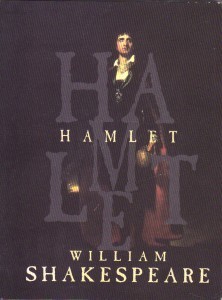 When your English lit professor or your director or your acting coach directs you to a certain passage in a Shakespearean play, does he say, "Please turn to Hamlet, page 783"? No. (Well, first of all, he's OBVIOUSLY working from an anthology if it has 783 pages to begin with.) He says, "Please turn to Act 2, Scene 2, Line 35." So what this means is I was smart and brought my little bitty Hamlet and everybody else was stupid and brought their big fat anthologies. And it makes no difference whatsoever.
When your English lit professor or your director or your acting coach directs you to a certain passage in a Shakespearean play, does he say, "Please turn to Hamlet, page 783"? No. (Well, first of all, he's OBVIOUSLY working from an anthology if it has 783 pages to begin with.) He says, "Please turn to Act 2, Scene 2, Line 35." So what this means is I was smart and brought my little bitty Hamlet and everybody else was stupid and brought their big fat anthologies. And it makes no difference whatsoever.
The two print books, Bible and Shakespearean anthology, have page numbers. But they aren't referred to or necessary for annotation or bibliography. In fact, the only thing they're used for is within the book itself to create tables of contents and indices. So let's talk about that.
TABLES OF CONTENTS, INDICES, and FOOT/END NOTES
There's only one thing a table of contents and/or index is good for: To find your place in the book. Thing is, in a print book, that's the only way you can find anything…maybe kinda sorta quickly.
In an e-book, the tables of contents and indices have completely different purposes. In fact, an index isn't even necessary in an e-book, although I would argue that a table of contents is. However, their function and mechanism of use are entirely different from that of a print book.
1. It's called a hyperlink.
Now, don't be scared. I'm sure you've seen them before here and elsewhere on the interwebz. You put your cursor over it and click and boom…you're somewhere else on the interwebz. Cool, huh?
You can do that in an ebook, too.
A list of hyperlinks in the beginning of the e-book serves the same function as the table of contents serves in a print book. A print book has page numbers after the chapter name. An e-book has a hyperlink you touch with your stylus and boom, you're there, same as it works on the interwebz. No page numbers? No problem! Not necessary at all.
But hyperlinks are good within the text, too. If a word is hyperlinked, you touch it with your stylus and it takes you to further reading. They used to be called "footnotes" and "end notes." Don't need those anymore, either. Oh, they're still footnotes and end notes, but they have no precise structure because it's not necessary. The device will take you where you need to go.
2. It's called the "find" function.
You can't do this in a print book. There is no CTRL-F. There is no "Find." You go to the table of contents and/or the index and if you're lucky, that book had an excellent indexer. If you're not, well, good luck to you then. I'm going out to get some Chinese while you look for that reference. Want anything?
Is there an e-reading device that doesn't have a "find" function? If there is, smash it and get something else, 'cause there is no point to an e-reading device without a "find" function. Because why? Because there are no page numbers.
If the argument (with regard to reference material) is that e-reference books can't be annotated or bibliographed or referenced, there's a simple way around that. Organize the book in some other fashion, a la the Bible or Shakespeare. It's been done. The system's only been around for a few hundred years now. If it ain't on paper, it ain't got pages.
And if it's inevitable, just lay back and enjoy it.
***
Further interesting reading from Moriah can be found here: Book Design with Microsoft Word: The Art of Moriah Jovan on The Book Designer blog.
.
December 27, 2010
Last chance to win a signed copy of RealmShift
Well, the last chance for now, at least. This is just a quick reminder that Book Lover's Club on Facebook is featuring RealmShift at the moment and they're running a contest to win a signed copy. Head over to their page here, click the Like button and leave a comment where you see the contest mentioned.
Tell your friends!
.



